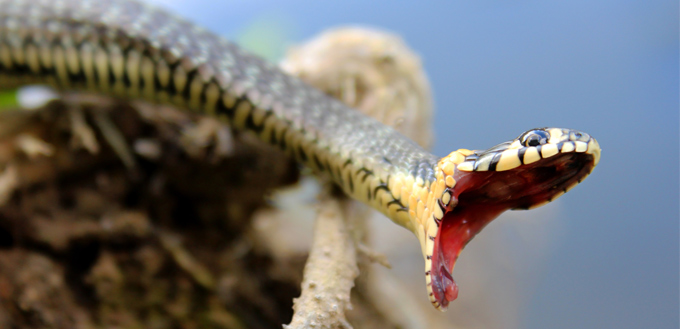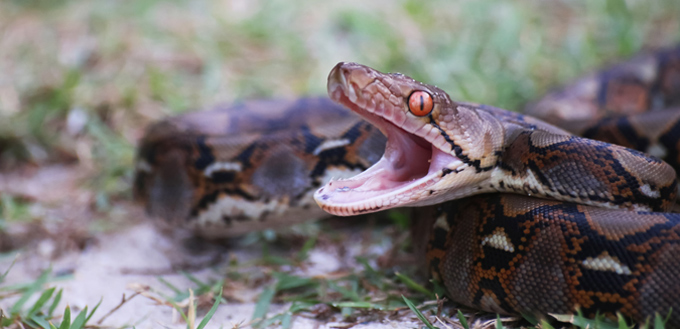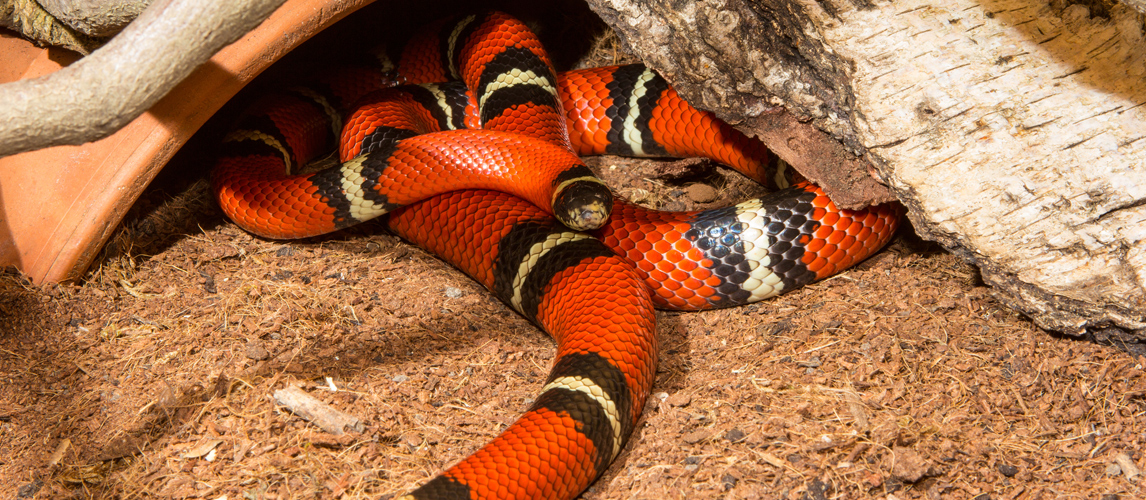If you get through this article without yawning, you’ve done better than me! Yawns are, after all, highly contagious, not to mention relaxing, but did you know that most vertebrates have been known to display this behavior from time to time? This ranges from monkeys and horses to fish and cats. Snakes, for example, are often reported by their owners to stretch out their jaws like they are yawning. While it is clear that snakes do yawn, it is less obvious why they do it. The only thing we are sure of is that it doesn’t simply mean they are tired.

What is a Yawn?
Understanding why humans yawn is actually a source of contentious debate among scientists. There are potential links to tiredness, needing oxygen, and illness. However, the leading theory is that yawning is related to temperature regulation in the brain.
This is called the brain-cooling hypothesis. The idea is that yawning both increases blood flow in the head and brings in cool air to cool down this blood flow and spinal fluid. The cooled fluids then cool your brain. This may also explain why yawning can make you feel more awake, and why you are more likely to yawn after hours of thinking, even if you been that physically active.
Research to support this theory proved that people, budgies and rats all yawn more in cooler weather, when the cold air can better cool the blood. However, why yawning is so contagious, and why the phenomenon of contagious yawning is only seen in humans and chimpanzees is less clear. Recent theories suggest it may be a sign of a more advanced ability to empathize, but this is strongly disputed.
A Snake’s Yawn
Ultimately, when it comes to yawning in all animals, scientists cannot seem to decide between physiological and social explanations. Another issue to confuse matters is that there is evidence to suggest that, either in addition to or instead of a universal explanation for yawning across all species, some species have their own, specific reasons for yawning.
Fish, for example, can appear to yawn when they are trying to clear their gills, and a wide variety of animals, from Baboons to Siamese fighting fish, yawn as a sign of aggression, which humans don’t tend to do. When it comes to snakes there are three generally agreed explanations for their yawns: preparing to eat, gathering information, and a symptom of illness.
Time for Dinner
Even if you do not have a pet snake, you probably know that snakes have very large jaws that allow them to eat their prey whole. It is often thought that they do this by unhinging their jaws, but this is not the case. A snake’s jaw manages to manoeuvre around seemingly impossibly large meals because they have two separate lower jaws on each side that are connected by ligaments, rather than bone.
This mouth gaping may happen before they are due for a meal, showing that they are hungry and that they are preparing to consume their prey. Once they have consumed this prey, the food moves down its body, sometimes you can still see its presence through a slight bulge in the snake, and is then digested over the course of several weeks.
Gathering Information
The second reason that your snake may yawn is to understand their environment better. It has been discovered that there is an organ on the roof of their mouths that is known as Jacobson’s Organ or the vomeronasal organ. Many yawning snakes are utilizing this organ by opening their mouths as wide as they can in order to expose it to the environment.
The vomeronasal organ works in conjunction with the snake’s tongue in a behavior that many pet owners will recognize. The tongue flicks in and out of the wide open jaw, almost tasting the air, and then bringing this ‘taste’ to the organ. Jacobson’s Organ then processes this sample of the chemicals in the air to deduce what potential prey is nearby.
Health Concerns
The bad news is that yawning in snakes may also be a sign of illness or disease. More specifically, yawning may be a symptom of a bacterial or fungal infection that they may have caught from their prey. Mice and rats, and many other of the prey that you may feed your snake, may be host to the larvae of potential parasites. If you are concerned that your snake has a parasite, look for other symptoms including:
- A reduced appetite
- Weight loss
- Diarrhea
- Abnormal Stools
- Vomiting
It is worth taking the time to source prey for your pet snake from a reputable source if you want to avoid their food giving them an infection. If you are worried that your snake’s yawning is a symptom of an illness, it is always better to be safe than sorry. We recommend that you bring them to your vet for a consultation. They will be able to test your pet for illness and provide the correct dosage of any medication that may be necessary.

Understanding Your Yawning Snake
Although these explanations are the three best understood reasons for yawning snakes, scientists still aren’t in agreement as to why humans yawn. This may mean there are other reasons that snakes yawn that are similar to humans, such as the brain-cooling hypothesis. Although scientists mostly agree that yawning in snakes is not a symptom of tiredness, there may be plenty of as yet undiscovered explanations.
Ultimately, we still know very little about yawning. Do all vertebrates yawn for the same reasons? Or are there differences between the types of vertebrates? Is there a social component, or is it all physiological? Maybe one day we will fully understand, but for now at least you can use your knowledge to make an educated guess that your snake is hungry, inquisitive or sick, and that you may need to take them to the vet.







Hi there,
i moved house last week and have only just moved my snake in today. A second ago i just saw him yawning and am just messaging to make sure it is just because he is in a new, unfimiliar environment. His feces are normal and was fed last week (next feed is next week). He is Miami cornsnake who is a 5yo male.
thanks a lot,